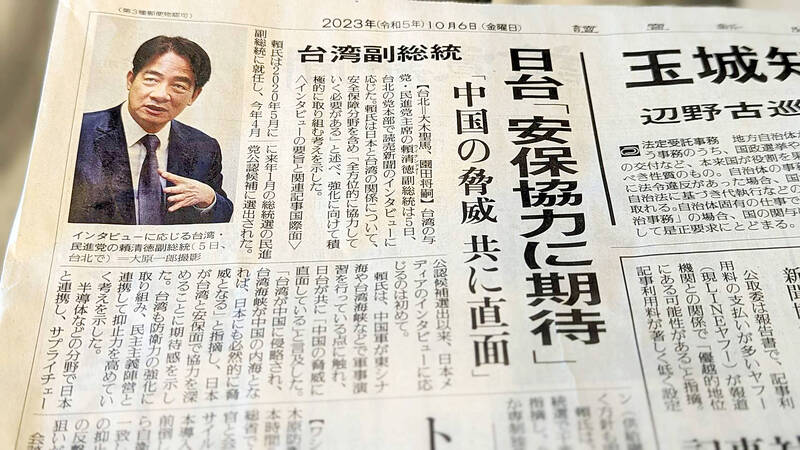Taiwan has shown it is already independent and sovereign by electing its own president and has no need for a separate declaration of independence, Vice President William Lai (賴清德) said in an interview with Japanese daily the Yomiuri Shimbun.
Lai, who is leading in opinion polls ahead of presidential elections in January, is the Democratic Progressive Party’s candidate.
He has said that he does not seek to change the “status quo” or Taiwan’s formal name, the Republic of China.

Photo: Lin Tsuei-yi, Taipei Times
In an interview with Japanese media, a transcript of which his campaign team released yesterday, Lai was asked about his position on Taiwanese independence.
Taiwan regularly elects leaders at all levels of government, from the grassroots up to the president, he said.
“So in fact, Taiwan is already sovereign and independent,” he said. “If it is not sovereign and independent, how can there be a presidential election?”
“Therefore, there is no need to declare Taiwan’s independence again,” he said. “My job is to protect Taiwan’s sovereignty [and] enhance democracy, peace and prosperity.”
China’s Taiwan Affairs Office did not answer calls seeking comment.
China has a week-long holiday this week.
Separately in an interview with Japanese broadcaster NHK that aired on Thursday, Lai called for more “security cooperation” with Japan to better ensure the stability of the region as it faces an increasingly assertive China.
Taiwan and Japan should “work together in every possible way” as they are on the front line of “Chinese threats,” Lai said.
China’s efforts to expand its influence have led to tensions in the Indo-Pacific, he said, adding that he looked forward to seeing Taiwan and Japan engage in necessary and plausible security cooperation to maintain peace and stability in the region.
However, he did not elaborate on what he thinks such cooperation should entail.
Lai also called on the world to unite in efforts to counter China’s military threat, if “a contingency” situation is to occur in the region.
“Instead of trying to predict when China would start a war against Taiwan, it is more important for us to have the best preparation all the time, in case of possible military conflict,” he said. “When the international community is united and prepared against possible conflict, then it would lower the likelihood of China launching a war.”
However, “if the international community only sees China’s big market for business opportunities, and does not see how dangerous China has become, then the international unifying force would collapse,” he added.
“It would increase likelihood of a Taiwan contingency situation,” he said.
Asked about dialogue with China on cross-strait relations, Lai said: “We are hopeful to have such dialogue and to push for further cooperation, if Taiwan could be treated with respect and be equal in status, but we cannot give up our national sovereignty, for the sake of dialogue with China.”
“If we lose our national sovereignty, then Taiwan’s freedom and democratic system will cease to exist,” he said, adding that the nation would become “just like Hong Kong and Macau.”
Additional reporting by Jason Pan

Taiwan has received more than US$70 million in royalties as of the end of last year from developing the F-16V jet as countries worldwide purchase or upgrade to this popular model, government and military officials said on Saturday. Taiwan funded the development of the F-16V jet and ended up the sole investor as other countries withdrew from the program. Now the F-16V is increasingly popular and countries must pay Taiwan a percentage in royalties when they purchase new F-16V aircraft or upgrade older F-16 models. The next five years are expected to be the peak for these royalties, with Taiwan potentially earning

STAY IN YOUR LANE: As the US and Israel attack Iran, the ministry has warned China not to overstep by including Taiwanese citizens in its evacuation orders The Ministry of Foreign Affairs (MOFA) yesterday rebuked a statement by China’s embassy in Israel that it would evacuate Taiwanese holders of Chinese travel documents from Israel amid the latter’s escalating conflict with Iran. Tensions have risen across the Middle East in the wake of US and Israeli airstrikes on Iran beginning Saturday. China subsequently issued an evacuation notice for its citizens. In a news release, the Chinese embassy in Israel said holders of “Taiwan compatriot permits (台胞證)” issued to Taiwanese nationals by Chinese authorities for travel to China — could register for evacuation to Egypt. In Taipei, the ministry yesterday said Taiwan

‘LIKE-MINDED PARTNER’: Tako van Popta said it would be inappropriate to delay signing the deal with Taiwan because of China, adding he would promote the issue Canadian senators have stressed Taiwan’s importance for international trade and expressed enthusiasm for ensuring the Taiwan-Canada trade cooperation framework agreement is implemented this year. Representative to Canada Harry Tseng (曾厚仁) in an interview with the Central News Agency (CNA) said he was increasingly uneasy about Ottawa’s delays in signing the agreement, especially as Ottawa has warmed toward Beijing. There are “no negotiations left. Not only [is it] initialed, we have three versions of the text ready: English, French and Mandarin,” Tseng said. “That tells you how close we are to the final signature.” Tseng said that he hoped Canadian Prime Minister Mark Carney

POSITIVE DEVELOPMENT: Japan and the US are expected to hold in-depth discussions on Taiwan-related issues during the meeting next month, Japanese sources said The holding of a Japan-US leaders’ meeting ahead of US President Donald Trump’s visit to China is positive news for Taiwan, former Japan-Taiwan Exchange Association representative Hiroyasu Izumi said yesterday. After the Liberal Democratic Party’s landslide victory in Japan’s House of Representatives election, Japanese Prime Minister Sanae Takaichi is scheduled to visit the US next month, where she is to meet with Trump ahead of the US president’s planned visit to China from March 31 to April 2 for a meeting with Chinese President Xi Jinping (習近平). Japan and the US are expected to hold in-depth discussions on Taiwan-related issues during the